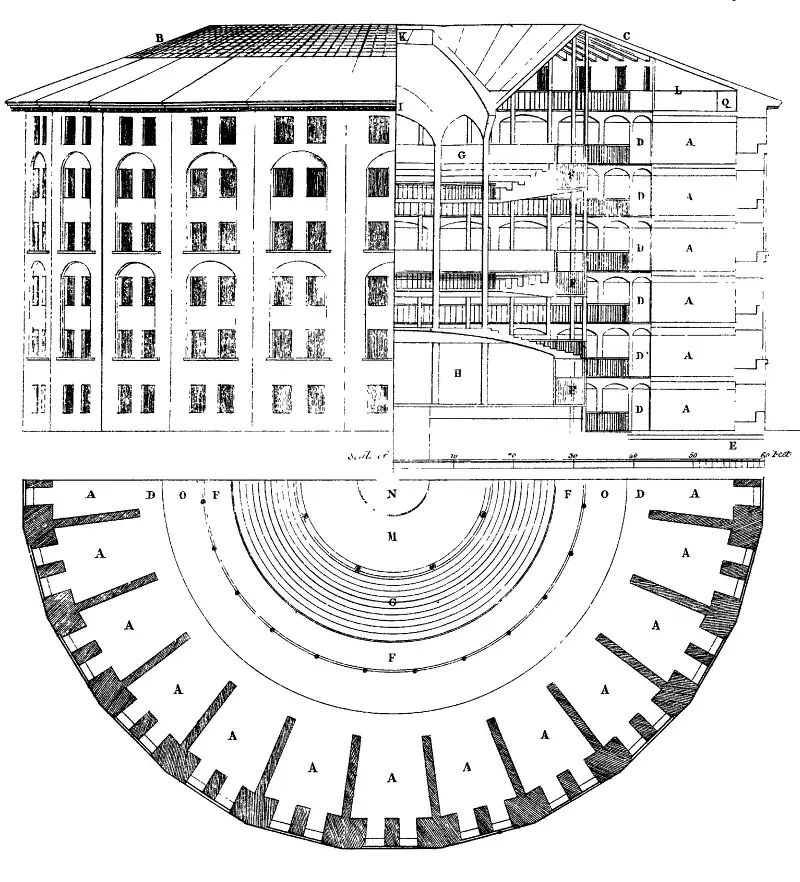Table of Contents
- Bentham’s Panopticon
- Foucault’s Interpretation of the Panopticon
- The Concept of Disciplinary Society
- Biopower and Governmentality
- The Impact of Foucault’s Analysis
- Critiques and Limitations
- Conclusion
The relationship between Jeremy Bentham’s Panopticon and Michel Foucault’s interpretation of it is a profound and essential topic in the realm of sociology. Bentham’s Panopticon, an architectural design for prisons, offers a powerful metaphor for modern disciplinary societies. Michel Foucault, a prominent French philosopher and social theorist, expanded on this concept, exploring its implications in his seminal work “Discipline and Punish.” This exploration reveals the Panopticon not merely as a physical structure but as a pervasive mechanism of power and control in contemporary society.
Bentham’s Panopticon
Jeremy Bentham, an English philosopher and social reformer, proposed the Panopticon in the late 18th century. The Panopticon is an institutional building designed to allow a single watchman to observe all inmates of an institution without them knowing whether or not they are being watched. This structure includes a central tower for the observer and a surrounding circular building divided into cells for the inmates. The architecture ensures that inmates are always visible to the observer while the observer remains unseen.
Bentham envisioned the Panopticon as an ideal model for various institutions, including prisons, schools, and hospitals. The primary purpose was to maximize efficiency and control through the possibility of constant surveillance. The psychological effect of being potentially watched at all times was intended to induce self-regulation among the inmates, thereby reducing the need for actual observation. Bentham believed that this would lead to more disciplined and orderly behavior.
The Panopticon represents an early attempt to rationalize and systematize institutional control. Bentham’s design reflects the Enlightenment values of reason and order, seeking to optimize the functioning of institutions through scientific principles. While the Panopticon was never built to Bentham’s specifications, its conceptual significance has had a lasting impact on theories of surveillance and social control.
Foucault’s Interpretation of the Panopticon
Michel Foucault’s interpretation of Bentham’s Panopticon goes beyond its architectural dimensions to analyze its broader social and political implications. In “Discipline and Punish,” Foucault uses the Panopticon as a metaphor for the ways modern societies regulate behavior and maintain control over populations. He argues that the principles underlying the Panopticon are emblematic of a new form of power that emerged in the 18th and 19th centuries.
Foucault’s concept of “panopticism” refers to a disciplinary mechanism that operates on the basis of visibility. He posits that modern power is exercised through surveillance and the internalization of norms rather than overt coercion. The Panopticon symbolizes this shift, where individuals are induced to conform to expected behaviors through the anticipation of being watched. The possibility of surveillance becomes a means of control, leading to self-discipline among the observed.
Foucault’s analysis extends beyond prisons to various social institutions, including schools, hospitals, and workplaces. He suggests that these institutions are organized around the principle of visibility, where individuals are constantly monitored and assessed. This pervasive surveillance creates a disciplined society where power is diffused and internalized, making it more effective and insidious.
The Concept of Disciplinary Society
Foucault introduces the concept of the “disciplinary society” to describe the new form of power relations that emerged with the advent of panopticism. In a disciplinary society, power is not concentrated in a single authority but dispersed throughout a network of institutions and practices. Surveillance becomes a central mechanism through which power is exercised, shaping individuals’ behaviors and identities.
In this context, the Panopticon serves as a model for understanding how modern disciplinary mechanisms operate. The key feature of a disciplinary society is the normalization of surveillance, where individuals are constantly subjected to monitoring and evaluation. This creates a self-regulating populace that internalizes norms and conforms to social expectations without the need for direct intervention.
Foucault’s analysis reveals how disciplinary power is embedded in everyday practices and institutions. Schools, for example, use examinations and reports to monitor students’ progress, encouraging them to adopt disciplined behaviors. Workplaces implement performance evaluations and surveillance technologies to ensure productivity and compliance. Even public spaces are subject to surveillance through CCTV cameras and other monitoring devices.
Biopower and Governmentality
Get the full article AD FREE. Join now for full access to all premium articles.
View Plans & Subscribe Already a member? Log in.





